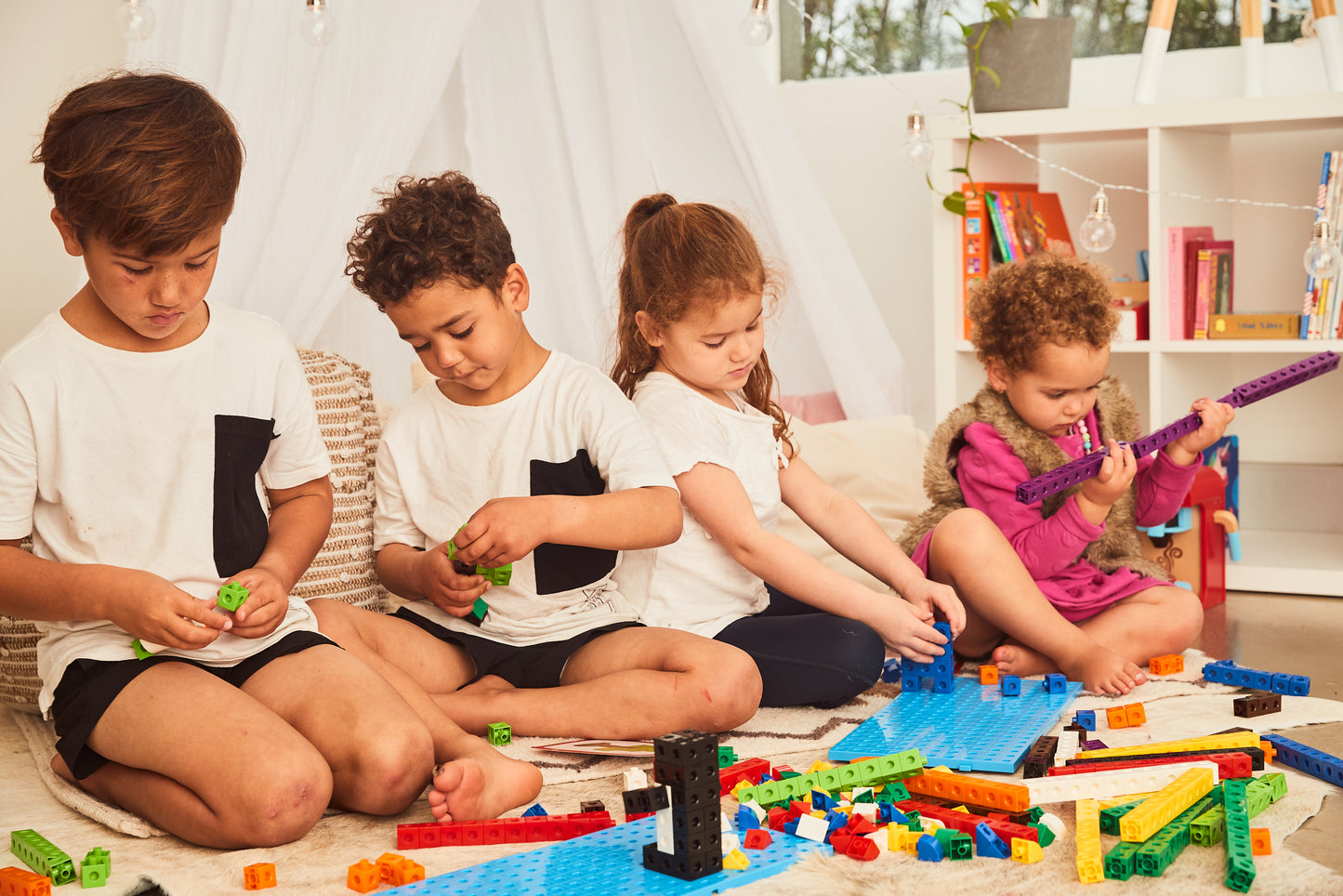
In recent years, primary education in the UK has increasingly emphasised the importance of foundational skills in mathematics. While technology has expanded learning options, research consistently underscores that hands-on, play-based learning remains one of the most effective ways for young children to grasp complex mathematical concepts.
At Edx Education, we passionately advocate for play-based learning, supporting parents and caregivers with tools and resources to foster early maths skills and a love for learning. Through toys like Math Cubes, Linking Cubes, Base Ten sets, and themed counters, we aim to make maths accessible, engaging, and fun. Looking at the abstract concepts of maths and making it concrete for children to learn.
The Shift Toward Hands-On Learning in Maths Education
Maths is one of the core subjects in the primary curriculum, but traditional methods of teaching, such as rote learning and memorisation, often leave children disengaged. The UK education system is increasingly recognising that young learners need to actively engage with maths concepts in ways that make sense to them. Instead of passively absorbing information, children benefit more from manipulating physical objects, such as blocks and counters, which helps bridge the gap between abstract ideas and tangible understanding.
Studies show that hands-on learning, also known as kinaesthetic learning, can enhance cognitive development by enabling children to explore mathematical concepts through real-world interactions.
This approach isn’t just about getting answers right; it’s about understanding the “why” behind them. When children play with maths tools like Math Cubes or Base Ten sets, they develop an intuitive sense of numbers, operations, and patterns, all of which are fundamental for future mathematical success.
Why Hands-On Maths Resources Are Essential
Tactile resources like Math Cubes, Linking Cubes, and Base Ten kits play a vital role in helping children develop number sense. Rather than perceiving numbers as mere symbols on a page, children can touch, stack, and organise these resources to visually and physically see how numbers interact. These tools provide a multi-sensory experience, essential for children to internalise mathematical concepts.
For instance, Math Cubes are excellent for teaching counting, addition, and subtraction. Children can see numbers grow or shrink as they add or remove cubes, providing an intuitive understanding of addition and subtraction. Similarly, Linking Cubes, which children can connect and disconnect, introduce ideas of multiplication and division, as they visually see the results of grouping and partitioning. These foundational skills are essential for building confidence in maths, setting children on a path of positive, independent learning.
The Benefits of Play-Based Learning in Maths
At Edx Education, we see the value of play-based learning as transformative for children’s mathematical understanding. Play-based learning turns maths into an enjoyable activity rather than a daunting subject. Through play, children engage with maths concepts naturally, without the pressure often associated with formal learning environments. This approach not only builds skills but also fosters resilience, creativity, and critical thinking, as children learn to solve problems, make decisions, and explore new ideas.
Incorporating hands-on learning into play helps children engage in authentic exploration and experimentation. Themed counters, for example, can make abstract mathematical concepts relatable and fun. When children use themed counters—such as animals, vehicles, or food items—they become more invested in problem-solving. Counting, grouping, and pattern recognition become playful activities, helping children to see maths as an integral part of their everyday world.
Supporting Parents and Caregivers with Resources and Tools
For parents and caregivers, understanding the value of hands-on learning can make all the difference in supporting their child’s mathematical journey. At Edx Education, we offer a variety of downloadable resources, including worksheets, activity guides, and tips to help integrate maths play at home. Our podcast, Play, Learn & Create with Edx Education, is also a valuable resource for parents looking to learn more about the benefits of play-based learning.
In a recent episode, we discussed how to use tools like Linking Cubes and Base Ten sets to support home learning. We cover topics like building early numeracy skills, encouraging problem-solving through play, and tips for making maths fun and accessible. The goal is to provide caregivers with practical strategies for building maths confidence in children from an early age.
Empowering Children Through Play
As trends in primary education continue to prioritise hands-on, experiential learning, the role of parents and caregivers in supporting this journey is more important than ever. By integrating play-based maths resources like Math Cubes, Linking Cubes, Base Ten, and themed counters into everyday learning, parents can empower children to explore mathematical concepts with curiosity and joy.
At Edx Education, we are committed to advocating for these hands-on approaches to learning. Together, let’s embrace the power of play, helping children discover the excitement of maths through exploration, creativity, and resilience. By turning learning into play, we’re not only building mathematical skills but also laying the foundation for lifelong learners who approach challenges with confidence and curiosity.
